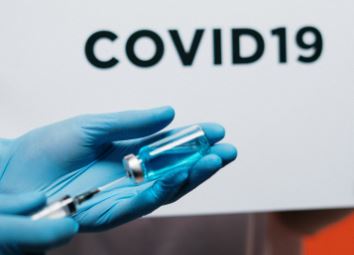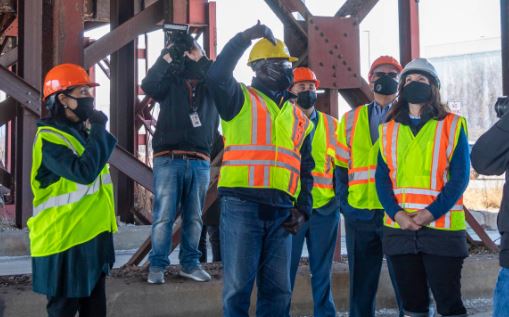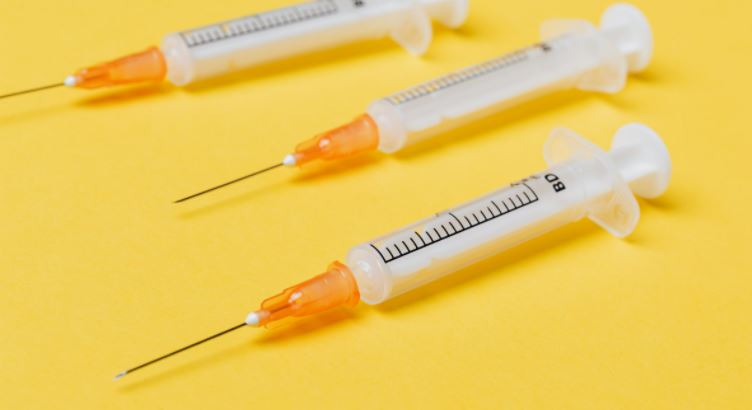
Michigan Expanding Access to COVID-19 Vaccine Starting Monday
Michigan Expanding Access to Safe, Effective COVID-19 Vaccine Starting Monday
Michiganders over age 50 with medical conditions and disabilities and caregivers of children with special health care needs will be eligible March 8; all Michiganders over age 50 eligible March 22
FOR IMMEDIATE RELEASE
March 3, 2021
Contact: Lynn Sutfin, 517-241-2112
LANSING, MICH. To help reach the state’s goal of vaccinating 70% of Michiganders over age 16 and bring a quicker end to the COVID-19 pandemic in Michigan, Gov. Gretchen Whitmer and Michigan Department of Health and Human Services (MDHHS) officials today announced the state is expanding vaccination eligibility beginning Monday, March 8. This change follows the announcement by President Joe Biden that ramped-up production will provide enough doses for 300 million Americans by the end May.
MDHHS is moving forward with the vaccination of Michiganders age 50 and older with medical conditions or disabilities and caregiver family members and guardians who care for children with special health care needs. Beginning Monday, March 22, vaccine eligibility will again expand to include all Michiganders 50 and older. To date, more than 40% of Michiganders age 65 and older have been vaccinated.
“The more people we can get the safe and effective vaccine, the faster we can return to a sense of normalcy,” said Governor Whitmer. “I urge all eligible Michiganders to get one of the three COVID-19 vaccines to protect you, your family and your community. We’ve already administered over 2.3 million doses to Michiganders of all races and backgrounds, and yesterday’s announcement that our national supply will be enough to protect all Americans by the end of May is incredible news. And as always: mask up, practice safe social distancing and avoid large indoor gatherings where COVID-19 can easily spread from person to person. We will eliminate this virus together.”
“Over 2.3 million doses of the safe and effective COVID vaccines have been administered in Michigan, and we know more vaccine is coming into the state,” said Dr. Joneigh Khaldun, chief medical executive and chief deputy for health at MDHHS. “We are pleased to expand eligibility for more people to get vaccinated as we continue to focus on our most vulnerable and those at highest risk of severe illness due to COVID-19. We are well on our way to vaccinating 70% of Michiganders age 16 and up. With three safe and effective vaccines now authorized for use, people should get the first vaccine available to them. These vaccines are the way we are going to end this pandemic.”
All vaccine providers may begin vaccinating the two new priority groups of 50 and older with medical conditions or disabilities and caregiver family members and guardians who care for children with special health care needs by Monday. Those eligible to receive a vaccine should:
- Check the website of the local health department or hospital to find out their process or for registration forms; or
- Check additional vaccination sites, such as local pharmacies like Meijer, Rite Aid or Cardinal Health (U.P. residents); or
- Residents who don’t have access to the internet or who need assistance navigating the vaccine scheduling process can call the COVID-19 Hotline at 888-535-6136 (press 1), Monday through Friday from 8 a.m. to 5 p.m., Saturday and Sunday, 8 a.m. to 1 p.m. or can call 2-1-1.
It is important to note that, while supplies are increasing, there remains a limited amount of vaccine available, so there may be a waitlist for available appointments. As more vaccine becomes available, the state will continue to move more quickly through the priority groups.
Last weekend, the U.S. Food and Drug Administration (FDA) authorized Johnson & Johnson’s COVID-19 vaccine for adults ages 18 and older. The vaccine is deemed 85% effective in preventing severe disease. Michigan will receive 82,700 doses of the Johnson & Johnson vaccine this week.
All three vaccines in circulation demonstrate high efficacy against COVID-19, particularly with preventing hospitalizations, severe illness and deaths. The vaccines have comparable safety profiles, with the Johnson & Johnson vaccine having the benefit of a single dose.
MDHHS is accelerating vaccination of these individuals due to concern around disparity in life expectancy and in an effort to remove barriers to vaccine access. The state recently launched a COVID-19 vaccination strategy guided by the following guiding principles:
- All Michiganders have equitable access to vaccines.
- Vaccine planning and distribution is inclusive, and actively engages state and local government, public and private partners; and draws upon the experience and expertise of leaders from historically marginalized populations.
- Communications are transparent, accurate, and frequent public communications to build public trust.
- Data is used to promote equity, track progress and guide decision making.
- Resource stewardship, efficiency, and continuous quality improvement drive strategic implementation.
MDHHS follows the Centers for Disease Control and Prevention (CDC) recommendations for prioritization of distribution and administration of COVID-19 vaccines. CDC recommendations are based on input from the Advisory Committee on Immunization Practices, the federal advisory committee made up of medical and public health experts who develop recommendations on the use of vaccines in the United States.
The most recent vaccine prioritization guidance can be found on Michigan’s COVID-19 website.
Even with the increase of COVID-19 vaccinations, Khaldun urges everyone to continue to practice preventative measures such as properly wearing masks, social distancing and frequent handwashing to reduce the spread of the virus until the vast majority of people have been vaccinated.
Michigan residents seeking more information about the COVID-19 vaccine can visit Michigan.gov/COVIDvaccine. Information around this outbreak is changing rapidly. The latest information is available at Michigan.gov/Coronavirus and CDC.gov/Coronavirus.











